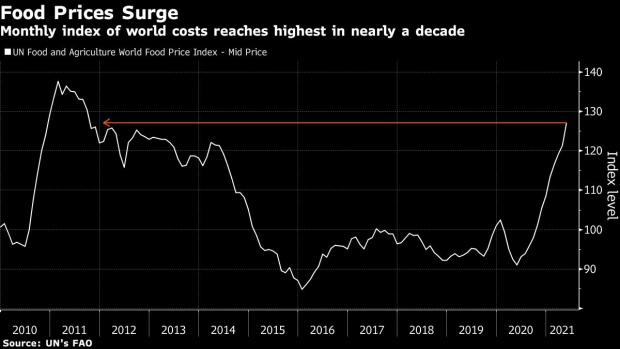Jun 17, 2021
Egypt Holds Interest Rates to Guard Against Global Price Surge
, Bloomberg News

(Bloomberg) -- Egypt left interest rates unchanged for a fifth straight meeting, seeking to guard against a possible surge in inflation caused by the spike in global commodity prices.
The central bank held the benchmark deposit rate at 8.25% and the lending rate at 9.25%, the Monetary Policy Committee said Thursday in a statement. All but one of 10 economists surveyed by Bloomberg predicted the move.
The decision extends Egypt’s pause in monetary easing that began in December, after authorities cut a combined 400 basis points throughout 2020 to tackle the pandemic’s impact. Now the concern is that a rocketing global food-import bill will accelerate Egyptian inflation, putting pressure on consumers and trimming the country’s highly competitive real-interest rate.
Consumer costs in urban parts of the North African nation already rose at their fastest pace this year in May, growing an annual 4.8% compared with 4.1% the month before.
Egypt, a major wheat importer, could feel a broader impact this summer, according to analysts. Goldman Sachs Group Inc. predicts inflation will spike at close to 6% in August if the government increases domestic fuel prices to reflect a global oil rally. That would be within authorities’ target range of 5%-9% by the end of 2022.
Leaving the benchmark untouched means Egypt will maintain a real interest rate -- the difference between policy and inflation -- that’s the highest of more than 50 economies tracked by Bloomberg.
That ranking has kept the country’s local debt attractive to foreign investors while tourism, a main source of foreign currency, awaits a full recovery. Egypt’s local-currency bonds have gained 5% this year -- the best performer in emerging markets after debt issued by Argentina and South Africa, according to Bloomberg Barclays indexes.
Some analysts see a chance of the central bank resuming easing in the fourth quarter. But Mohamed Abu Basha, head of macroeconomic research at EFG Hermes, says such a step may not happen until 2022, “given how alarming the inflationary risks are” and recent rate hikes in other emerging markets such as Russia, Brazil and Ukraine.
©2021 Bloomberg L.P.


